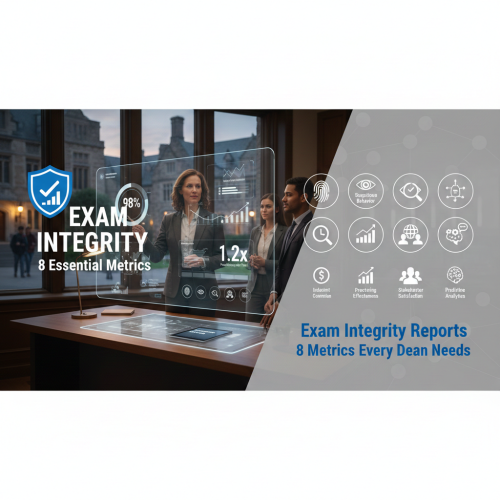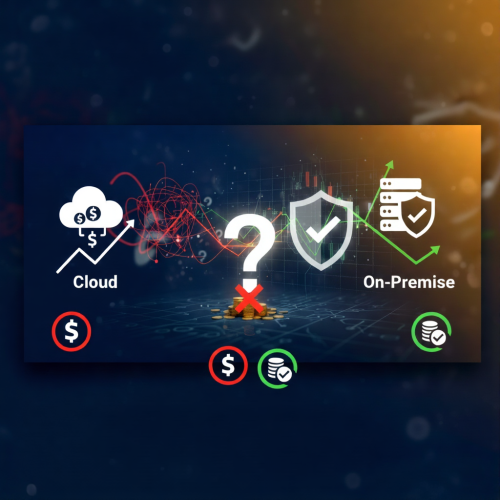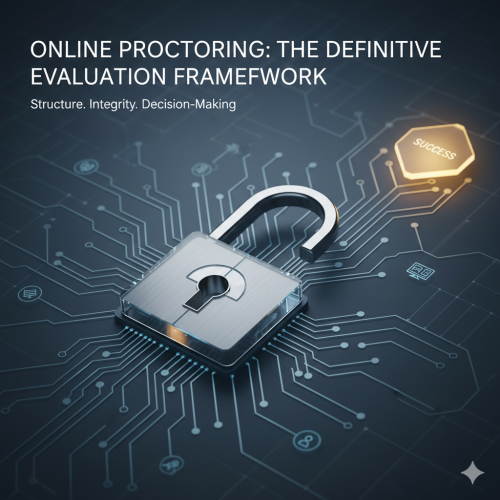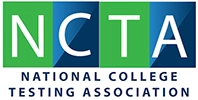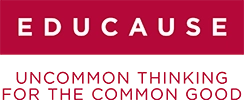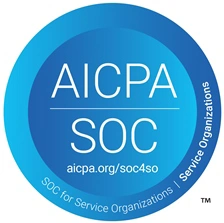Selecting the right remote proctoring solution is more crucial than ever. With high-stakes exams moving online, institutions need comprehensive security without sacrificing user experience. Before investing in a proctoring platform, here are twelve essential questions every decision-maker should carefully consider.
1. What Type of Proctoring Meets Your Specific Needs?
Not all proctoring is created equal. Different exam scenarios require different levels of security and monitoring:
AI Auto-proctoring works well for lower-stakes assessments with its automated monitoring and flagging of suspicious behaviors. This non-disruptive option offers 24/7 availability with minimal human intervention.
Live proctoring provides human oversight in real-time, allowing immediate intervention when issues arise. This option comes in several forms at Proctor360:
- Single webcam monitoring (standard security)
- Multi-camera surveillance using a cell phone as a second camera
- 360° Total View™ proctoring with proprietary headset technology for complete environmental visibility
Consider what level of security your exams truly require before committing to a solution.
2. How Flexible Is the Proctoring Platform?
One critical mistake many institutions make is choosing a one-size-fits-all proctoring solution. Your organization likely delivers various types of assessments, each with different security requirements.
The ideal platform should offer customizable options for each exam, allowing you to configure:
- Proctoring type (AI vs. live)
- Security settings
- Allowed resources
- Time limitations
- Environmental requirements
As Proctor360's approach demonstrates, flexibility ensures you're not paying for unnecessary security on low-stakes exams while maintaining rigorous monitoring where needed.
3. What Is the User Experience Like?
Even the most secure proctoring solution fails if it's too complicated for test-takers to use. Consider:
- Is the interface intuitive and user-friendly?
- How smooth is the check-in process?
- What technical requirements must students meet?
- Is there adequate support for troubleshooting?
Remember that poor user experience leads to increased anxiety, support requests, and potential exam integrity issues.
4. How Reliable Is the Technology?
Technology failures during high-stakes exams can be disastrous. Evaluate:
- Does the platform handle large volumes of concurrent users?
- What happens if a student loses internet connectivity?
- Is there redundancy built into the system?
- What's the provider's track record for uptime?
A truly reliable solution includes contingency plans for technical difficulties and minimizes disruption during assessment periods.
5. What Identity Verification Methods Are Used?
Confirming test-taker identity is fundamental to exam security. Look for multi-layered verification:
- Government ID verification
- Biometric matching
- Knowledge-based authentication
- Continuous identity monitoring
Advanced solutions like Proctor360's 360 Total View™ provide enhanced security by capturing the entire testing environment, making impersonation virtually impossible.
6. How Does the System Detect and Prevent Cheating?
Beyond basic monitoring, sophisticated proctoring solutions employ multiple cheating prevention techniques:
- AI-powered behavior analysis
- Browser lockdown capabilities
- Secondary device detection
- Environmental scanning
- Screen recording and analysis
Understand exactly what behaviors trigger flags and how the system handles potential violations.
7. What Integration Capabilities Are Available?
Seamless integration with your existing systems saves time and reduces errors. Consider:
- LMS compatibility (Canvas, Blackboard, Moodle, etc.)
- Assessment platform integration
- Student information system connections
- API availability for custom development
The best solutions offer plug-and-play integration with minimal IT involvement.
8. How Comprehensive Is Technical Support?
Support quality dramatically impacts implementation success. Evaluate:
- Support availability (24/7 vs. limited hours)
- Support channels (phone, chat, email)
- Average response time
- Support for both administrators and test-takers
- Training resources and documentation
Remember that support needs often peak during exam periods when timely assistance is most critical.
9. What's the Total Cost of Ownership?
Look beyond the advertised per-exam price to understand the complete financial commitment:
- Per-session vs. subscription pricing models
- Additional fees for specific features
- Implementation and training costs
- Volume discounts and long-term contracts
- Support and maintenance fees
Some providers offer substantial discounts for longer-term commitments, while others provide more flexibility with per-session pricing.
10. How Is Data Privacy and Security Handled?
With increasing regulatory requirements and privacy concerns, data handling practices are paramount:
- Compliance with FERPA, GDPR, and other regulations
- Data storage policies and locations
- Encryption standards
- Data retention and deletion practices
- Third-party data sharing policies
Seek providers with comprehensive privacy policies and clear documentation of their security practices.
11. What Scalability Does the Platform Offer?
Your proctoring needs may change over time. The solution should grow with you:
- Handling increasing user volumes
- Supporting additional exam types
- Adding new features as technology evolves
- Expanding to new departments or programs
Scalable solutions prevent the need for painful migrations as your program expands.
12. What's the Provider's Track Record and Reputation?
Finally, evaluate the company behind the technology:
- Years in business
- Client retention rates
- Industry certifications (SOC 2, GDPR, etc.)
- Client testimonials and case studies
- Company financial stability
Established providers with proven success in similar institutions often represent lower-risk options.
Making Your Final Decision
When choosing online exam proctoring software, remember that different exams may require different approaches. The most flexible providers, like Proctor360, offer multiple proctoring methods within a single platform, allowing customization for each assessment's specific needs.
By thoroughly addressing these twelve critical questions, you'll identify the remote proctoring solution that best balances security, usability, and cost-effectiveness for your specific requirements. This careful evaluation process ensures your online assessments maintain academic integrity while providing a positive experience for test-takers.
Don't settle for one-size-fits-all proctoring when today's technology can deliver precisely the security level each exam demands. Your students and your institution deserve nothing less.

